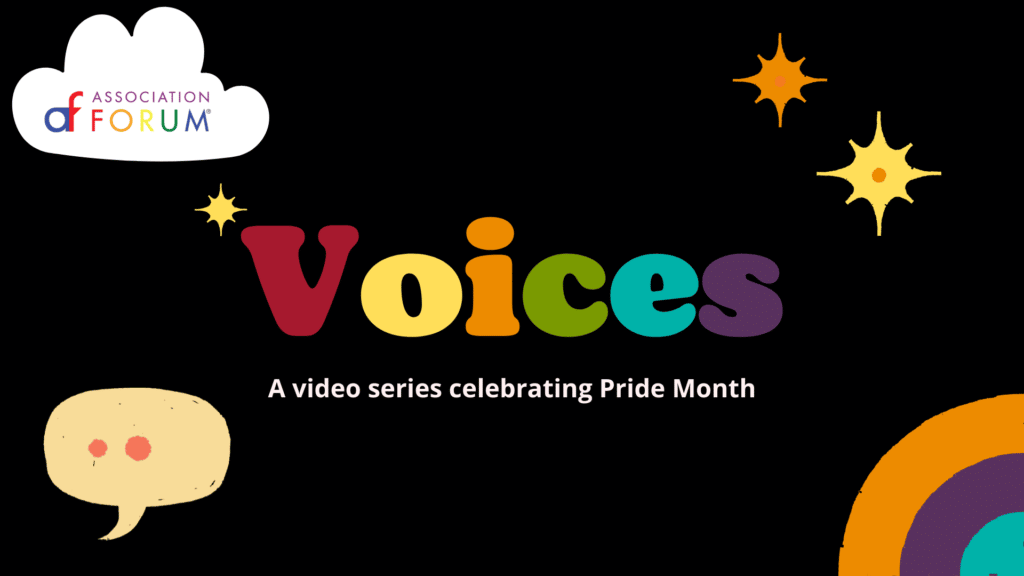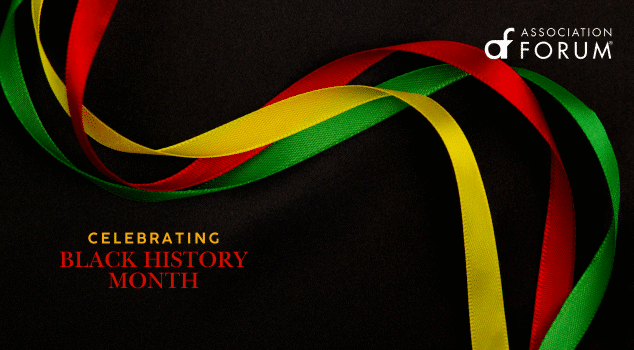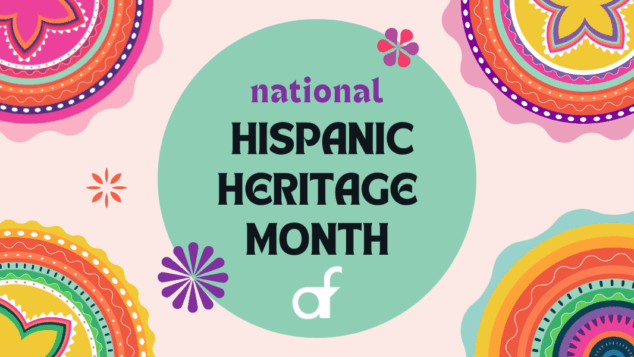VOICES: Colette Marquardt on How to be Unapologetically Inclusive

Association Forum’s LGBTQ+ Advisory Group presents a series of videos to celebrate and reflect upon Pride Month. Over the course of the month, we’ll speak with members of the association community and ask them what Pride Month means to them. Colette Marquardt is the executive director of the American Camp Association, Illinois. In this video, she speaks with Association Forum CEO Artesha Moore about what Pride Month means to her and how association professionals can make “good trouble”. Check back for more videos from this month-long series!
Below is a transcript of the conversation:
Artesha Moore: Welcome everyone. I’m Artehsa Moore and I’m the president and CEO of Association Forum. I am very lucky today to be joined by Colette Marquardt, who is going to give us a little bit about her background and tell her beautiful story during Pride Month. So, Colette welcome.
Colette: Thank you. Thanks for having me. I’m Colette Marquardt. I’m the executive director of the American Camp Association, Illinois, and I get to work with our wonderful summer camp professionals and industry here in Illinois.
Artesha Moore: And I think that is a really beautiful tie in to coming into Pride Month. I’m thinking of summer camp and the people who really provide that beautiful experience are really kind of the touch point as it starts into to things of exposure of opportunities and what it looks like and who could be right as a professional and aspire to be. So, as I think about that and the importance of that, my first question for you is what does Pride Month mean for you?
Colette:Pride Month, it’s evolved for me as I continue to grow older and throughout my profession, especially, and in my personal life. And I’d say that now, to me, it’s really a time of reflection of where the movement and the community has come from and where we need to go. And so looking at the great progress, but keeping our eyes on the work of inclusion and social justice, it still needs to be addressed.
And it’s an opportunity for our folks in the community who don’t live in safe spaces, or don’t work in safe spaces, or are questioning their own identities and who they are to also see, very visually examples and role models, because that wasn’t always the case.
There was a long, long history of not really being able to see yourself reflected. And so I think that Pride offers that opportunity.
Artesha Moore: I agree. I agree. I think as an ally, it also gives me a focal point to be able to really kind of deepen my learning. But I like that part of the reflection, especially as we really understand that we’re still in a time where we’ve come so far, but yet we still have far to go and still have lessons to learn, which I think is really important.
So thank you for saying that because I do think that we have a journey to get to a truly inclusive, truly supportive, and equitable world, but we’re going. We’re getting a little bit closer each time. So as I think about the power of Associations, I’ve been in the industry for over two decades at this point, as I look at the work that we do, I think how powerful we are as a collective, and in Chicago and the Association Forum. I’d like to hear from you, how can the Association industry become more inclusive?

Colette: That’s a really good question. I think we can continue to role model our value system as Associations. I think oftentimes industries look to Associations to know the direction that we need to move and are seeking advice. And if they don’t have the answer, whether it’s about inclusion or about your particular field, they look to us for help, for answers, and for support and when we’re talking about inclusion, simply role modeling, I believe, makes a huge difference.
So if we say we are unapologetically inclusive. We unapologetically support LGBTQ people in communities and rights. And that’s sending a message to the industries that we’re working with and to these workplaces. And when people spend a third of their life in their workplace, those spaces need to be safe. And everybody thrives when industry thrive. But how can you thrive if you’re not in a safe and inclusive space?
And so I think as Associations, we can really just model what is right and what is just by, again, being that unapologetic force and not shying away from the hard conversations. And with that, being bold enough to know that some people will be with us and some people won’t be with us, but we need to stay on the right side of justice here.
Artesha Moore: You said something that just resonated with my whole body. It was a whole body, yes. Some folks may not be with us. And I think that at this point, that’s where we are as Associations, as a society. We know that there’s going to be more and more folks of fear or whatever that is, that leads them to not be with the masses as we move to inclusion. So I thank you for saying that because as we go into, especially right now in Pride, we also have Juneteenth. We also have all the heritage months that are coming. We are all making good trouble.
And so that’s, I think, as we go forward, that’s going to be more and more important. And then that other point about what representation looks like and modeling the way. There’s still some of our industry, in Associations, we tend to be more diverse, more inclusive as a staff, but some of our industries are not. And, and so how we navigate that, I think, in some ways is going to be pivotal as we move forward as a society.
Colette: Absolutely. And I love the point about the good trouble because that is. And that there are moments where we might have members say, “I don’t want to be a part of you because you support this example of LGBT rights.” But when we look at the way that social justice movements have worked, and what we’re seeing now with Gen Zs, with millennials, even with Gen Xs and these decision makers coming to the table, that we might lose one person over here, but there’s these people in the wings that are looking for value based organizations that truly and authentically live their values and are not putting the profits first, but the people first.
And if we put the people first, the people will come. And then that’s where, when we look at business models and organizational structure and support and resources, those things come when we bring in the people. But how can we continue to bring in the people if we don’t really make it an inclusive space?
Artesha Moore: Exactly, exactly. And I think, as you said that, I think for all of us that are trying to figure out what engagement looks like moving forward, it is going to be this whole representation, but also alignment from a bigger societal piece.
So again, I think that what you’ve brought forward today is the seeds that we’re planting across our profession that really will amplify in so many industries globally to be able to get there. So I’m hopeful.
You mentioned something that made me think of my last question here. We are always kind of, I have little images up in my office and at home of people who are deeply admired to remind me of what it is that I do and why I fight this fight. So the question that I have for you, Colette, is who do you look up to? Who do you admire? Who are your heroes?

Colette: I have a group of mentors throughout my career that I’ve really continued to look up to. And one of them is a previous supervisor of mine who was really the first out lesbian that I’ve I’d ever really worked with or for in the professional setting. And it was a role modeling of over 20 years ago when that just wasn’t a thing. And I think that it’s important that we also recognize in Pride Month that we still have generations of people who have gone into their careers or lived their lives without role models and heroes to really look up to.
And so looking, I see those folks as the people who I really do think are very heroic in that they pushed forward a lot of this work in a time that they were getting fired for being out or they’d be fired for just looking gay or lesbian. If they had short hair and they were a woman. “We can’t have that in our organization or our company.”
And so I think that really speaks to me is just these generations of people that have fought for these pieces. It’s also what drives me too, is that another hero of mine worked in the camp industry to make LGBT inclusion a thing. And that was in the 90s. And I think about that she worked for 50 years to do all sorts of great advocacy work. And that work, like we were talking earlier, it’s little steps. And there is hope because we can look back to see where we’ve come, but also this importance of carrying on the work for the next generation.
And that some of that work won’t even… I think what I’ve really gotten from reflecting on my heroes and mentors is that I will not see some of the benefits of the work I’m doing, or my colleagues are doing now in my lifetime. But knowing that in 50, 75 years, it will be different.
Artesha Moore: That’s exactly it. And I think in some aspect, the beauty of things like technology and this kind of Moore’s law that it’s kind of keep doubling over time until it explodes, I guess. But as we think about that, one of the things that I love about today versus again, been doing this for a few decades at this point, I can feel impact even in some touchpoint, a post that goes in, this video it goes out. Somebody will reach out to you, LinkedIn, or go to your website and really say, “Hey, Colette, something you said really helped fuel me.”
So I think that, yes, it’s important for all of us, the allies, the ones in the community, all working together to do what we can where we are, and then keep the eye on the future. And that future could be five minutes from now.
Colette: Right.
Artesha Moore: Yeah. Colette, this was fantastic. Thank you so much for this time today and thank you for these nuggets. Because I, again, it’s all about inspiring one person with one comment. So this conversation was great.
Colette: Thank you. Thanks for having me. And I appreciate all the work of the Association Forum when it comes to inclusion and helping to make our Associations more inclusive. Because, as we spoke about before, Associations really represent these entire industries and the worlds around us. And so if we can make our Associations more inclusive, that ripple effect is going out to all of these companies and organizations and industries.
And that’s a pretty remarkable place for us to be in as Association leaders. It’s pretty powerful and we have the opportunity to make some really good change
Artesha Moore: On that note I will end this session. Thank you so much. Go out there and keep changing things.
Colette: Thank you. You too.
Tags
Related Articles
BAE Chicagoland Kicks Off: Join the Movement!
Black Association Executives (BAE) is officially in Chicagoland, bringing a bold new community to Black...
Celebrating Hispanic Heritage Month with Association Latinos
How to celebrate Hispanic Heritage Month within the association community and Chicago!
Tips for Creating a Welcoming Meeting Environment
Creating a truly inclusive annual meeting means going beyond ADA compliance—discover how one association builds...




